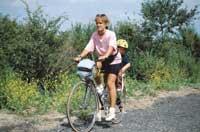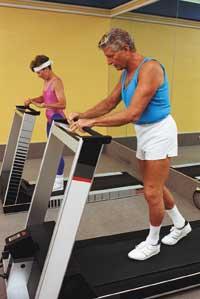Advantages of moving

But, as scientists at the Salk Institute of California have shown, running a rat means improving its memory and learning capabilities, comparing them with another sedentary rat. And it's not just that: in the hypothalamus (and this is the region or area of the brain that handles memory), US researchers also saw that the rat 'athlete' had more neurons than other useless rats.
About a hundred sedentary people between 60 and 75 years old were also studied at the University of Illinois and were asked to spend about 45 minutes a week, as well as being able to do so quickly. After six months, they were matched to another group that only performed stretches. And it was verified that the first group had a greater selective capacity and planning and coordination.
The key is the role endorphins play
Today it is known that physically more active people live in general more and better than more passive people.
But, why is it good to exercise? Why does exercise positively affect the brain? Today, scientists have clarified the problem: the practice of sports or physical exercise releases endorphins in the blood that act as natural analgesics, improving self-esteem, decreasing anxiety and increasing the ability to combat stress.
Sports practice (or at least exercise) also helps man overcome his sexual impotence. So says at least the study conducted by the University of Boston in nine years with 600 men. The conclusion is: Those who start regularly in sports practice at about 50 years have less risk of suffering impotence by releasing substances such as dopamine and serotonin, by improving the circulatory and endocrine system.
10 reasons to move around
- Impotence. Physical exercise, if often done, helps prevent this sexual dysfunction by facilitating blood flow. Especially in advanced age.
- Cholesterol. Movement is the only drug or remedy that raises or collects the cholesterol called "good". When moving, the production of an enzyme that metabolizes both cholesterol and triglycerides is stimulated.
- Diabetes. It has been shown that physical activity or exercise decreases II. Number of people with type diabetes (or adults).
- Heart . The active person has a lower risk of infarction or hypertension if his activity is regular and moderate. But the 'weekend athletes' can have great dislikes.
- Bones. Exercise helps to fight osteoporosis and to maintain bone mass at its level. It also serves to prevent fragile bones by reducing the risk of fractures.
- Arthritis. Those with this disease have fewer symptoms and, above all, less pain with exercise.
- Memory. According to recent studies, exercise increases learning, concentration and memory capacities.
- Good humor. Physical exercise improves humor and is a source of pleasure. It is recommended to fight depression (in light cases) and increase self-esteem.
- Longevity. Studies show that doing sports 3 times a week between 30 and 45 minutes reduces the risk of premature sudden death. Walking, running and cycling are, it seems, the secrets to live for a long time.
- Cancer. Regular exercise reduces the risk of colon and breast cancer by decreasing the levels of some hormones.
The favors are countless
One of the biggest benefits of sports practice is the increased production of testosterone (male sex hormone that is secreted in the testicles). This increases the person's immunity by increasing the number of red blood cells and decreasing infections.
Exercise also benefits the bones: besides influencing their normal development of childhood, it keeps bone mass in young adults, preventing bone loss and, perhaps, revolutionizing this process. Any age is good for practicing sport in a normal and regular way, provided it is adjusted to the physical condition of the person.

The joints also thank the exercise. This is because, if they move continuously, they are usually more lubricated (which avoids reducing movements), maintaining flexibility and reducing the effects of certain degenerative orthopathies type reuma. Older people who exercise are noticed: they move better, are more lively, and are therefore more independent. In addition, the risk of falls decreases considerably.
Moderate physical exercise also reduces one of the worst epidemics of our time, cancer. Thus, it is observed that colon and breast cancer decreases by 20% 40. Why? Apparently, these tumors are hormone-sensitive, i.e., at a higher level of certain hormones, a greater chance of suffering the tumor.
And physical exercise, when done on a regular basis, reduces estrogen, and by increasing intestinal mobility, toxins also have a lower contact with the colon.
Heart health also improves with movement. It is shown that people who exercise regularly have fewer cardiovascular diseases, due to the decrease in risk factors. Exercise increases the 'good' cholesterol, controls hypertension in its proper measure, II. It controls diabetes naturally and reduces stress.
Resistance or strength?Aerobic exercise. Resistance exercises (or duration) are fundamentally aerobic: the effort is gradual but continuous. Among them are swimming, cross-country skiing, and cycling. In these cases the heart sends little oxygen to the muscles. Anaerobic exercise. The strength exercises are, above all, halterophilia, bodybuilding, speed racing, sprints or javelin launch. In these cases the exercise is shorter, but the effort is very hard (in less time). |
Key in permanence
The key is constancy, not despair. But when elite athletes also stop exercising (or sport) their results deteriorate a lot. Thus, an investigation carried out at the University of Washington concluded that a group of athletes (elite cyclists and swimmers) who were in excellent physical condition, stopped practicing sport for 12 weeks. And when they started again it was seen that they lost half of the capacity of their aerobic training. Therefore, it is best to exercise every day: besides being beneficial and not having side effects, exercise is cheap and if you are looking for the exercise you like does not require excessive sacrifice.
But, of course, for exercise to have a preventive and healthy effect, it must be constant, at least 45 minutes, three times a week. And what kind of activity will you ask? Whenever possible, aerobic exercise is always preferable (see chart) and if you are over 35 years old, before starting exercise you should do a check or a specialized health exam.
Swimming, cycling, running, hiking or skiing, always progressively and moderately, are perfect for the body. It is to move the account. And this advice is valid for any age, but especially if you're around the age of 30, it's at that age when it starts "still… the time to prevent". However, exercise, whatever your age, is a friendly reader, if we do it well and moderately, is always beneficial.
Seasonal maintenance (or type)The body needs energy every minute and second. Therefore, it does not stop burning calories, even when we sleep. The amount of calories burned per day depends on the level of physical condition in each person and the intensity or duration of the exercise you perform. All forms of exercise can cause weight loss, using and burning energy stored in the form of fat (calories). How many calories are usually burned? The normal means are:
|
Buletina
Bidali zure helbide elektronikoa eta jaso asteroko buletina zure sarrera-ontzian








